“A goose is a goose still, dressed as you will.” Henry David Thoreau, Walden
However, one dresses it in misinformation and sanctimonious Media outrage, by any objective sense, what is happening right now in Venezuela is still a coup. Recent open threats of US military intervention from the Trump Administration mask the fact that intervention is already under way. In fact Venezuela has been suffering a slow-burn, yet devastating internal insurgency and economic war since the optimistic beginnings of the ‘Bolivarian’ socialist revolution in 1998. More recently this has taken the form of illegal economic sanctions set to cost Venezuela $11bn in 2019, a CIA planned and executed constitutional coup, information war and ‘black ops’ missions both from the US, and across the porous Colombian border.
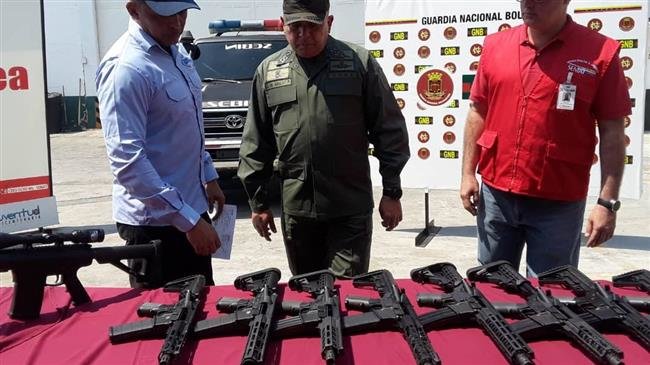
Venezuelan authorities stand next to US-made weapons seized from a cargo plane coming from Miami, Florida. (Photo by Ministry of Interior, Justice and Peace)
Any way it is spun, such political and military intervention by the US will make the situation many times worse for the people of Venezuela which should be the paramount concern. Why is this happening? It’s pretty simple: oil (the biggest remaining reserves globally are in Venezuela) and ideology (an ideological quest to replace socialism, indigenous peoples’ rights and independence with white supremacy and subjugation in Latin America).
The US has refused to acknowledge President Maduro as the elected leader of Venezuela despite extensive evidence the electoral system is extremely fair and robust. Instead the US and its European allies have recognised the relatively obscure head of the National Assembly, Juan Guaidó of the conservative ‘Popular Will’ party as leader. This move is almost unprecedented, being the first time a leader without effective control over even part of a country has been acknowledged by the US since World War II (even Saddam was afforded the privilege of being the called President... right up until Iraq was illegally invaded).
Trump and his opposition puppets led by Guaidó – according to John Pilger - a creation of the CIA-front National Endowment for Democracy, have now ruled out a negotiated solution or even dialogue with the legitimate Government of Venezuela. This ‘zero sum game’ approach clearly shows that the US administration’s only intention is regime change to install a compliant far-right dictatorship over which it can exert full control. However, it also means the most likely outcome, regardless of whether Guaidó comes to power or not, is a protracted and bloody civil war like the one still smouldering across the Colombian border between a fascist government and socialist rebels. This risky approach will do nothing to deliver more democracy, human rights or a better economy for the people of Venezuela. What it will do is restore the pre-revolution state of white supremacy, inequality and racism in Venezuela and reverse many of the gains made by the Bolivarian revolution in literacy, poverty reduction, participatory democracy and community/worker control over resources.
A Geopolitical Power
Play
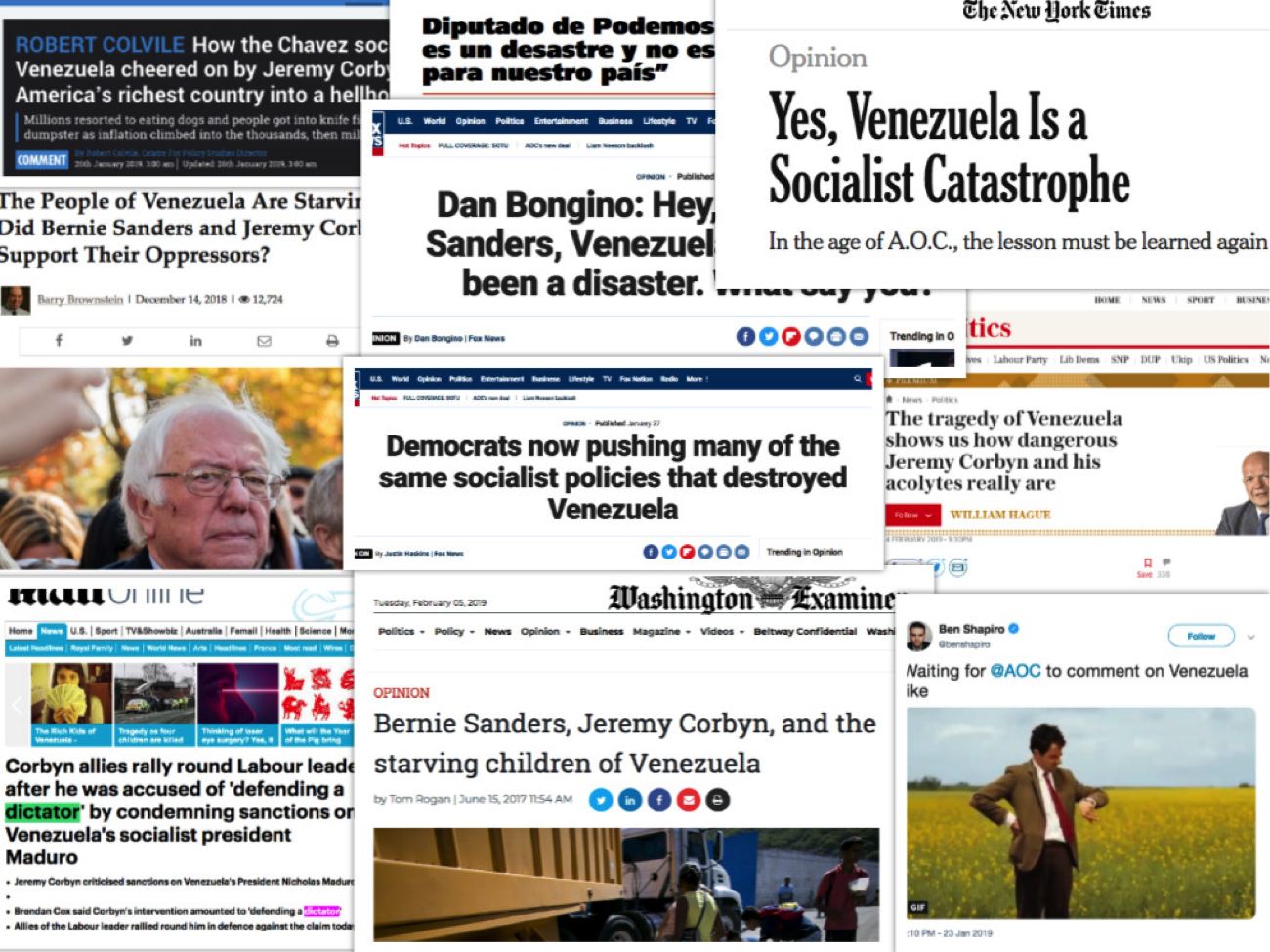
Regardless of any imagined faults in Venezuela’s ‘democratic freedoms,’ the fact that consent is being so aggressively manufactured for an invasion by the US and Corporate Media should set alarm bells ringing. By refusing to play the game by the neoliberal ruleset of global capitalism, the ‘Bolivarian’ socialist revolution of Venezuela ushered in by Hugo Chavez’ landslide democratic election in 1998 has consistently attracted the scorn of the global media, business and political elites. The ‘Dictator’ and ‘Socialism’ centric media narratives taste a lot like the rehashed leftovers of the ‘Gaddafi’ or ‘Saddam’ ones and alarmingly like the ‘red-baiting’ of pre-world-war II Germany or the Cold war. We have truly entered the surreal post-fascist era of manufactured ‘national emergencies’ and perpetual wars in both the physical and information arenas painted so vividly in Orwell’s Big Brother... people buckle up.
Despite the Political and Media hype, Venezuela is still not even a very socialist nation, leaving many on the left calling on Maduro to deepen the Bolivarian revolution. In fact Matt Breunig for Peoples Policy Project outlines with correlating data that Norway is far more socialist than Venezuela. However, socialism appears to be a convenient ‘boogieman’ for the Trump Administration to use to further its ambitions.
The Trump Administration appears to be refocusing its attentions on reasserting US hegemony of the Latin American region. Democracy Now reports that the Trump Administration recently openly stated its intention in the Wall Street Journal of openly talks of defeating the ‘troika of tyranny’ by invading Venezuela, Cuba and Nicaragua to reassert full neoliberal capitalist control of Latin America.
This US aggression in Latin America is also a pretty calculated and overt ‘F* you!’ to Russia and China and indeed the entire “Global South,” as the US tries to shore up the natural resource rich Latin American region strategically by destroying a strongly indigenous elected government. Effectively, the US has now staked a claim on half the world. Senate Armed Services Committee chair Jim Inhofe has threatened Washington might have to intervene in Venezuela if Russia dares set up a military base not just there, but “in our hemisphere.”
Already the US-anointed Venezuelan opposition faction have suggested they may not honour debt for oil deals with Russia and China signed by Maduro, a not too subtle threat. Russia has in return vowed to protect its interests in Venezuela using “all mechanisms available”. This direct provocation by the US to global free trade is effectively an attempt by Trump to both starve Venezuela and to relaunch the cold war (or World War III), and has echoes of the tension of the Cuban blockade and Missile crisis. Russia and the US have now proposed rival draft resolutions at the UN on Venezuela with Russia’s one calling out the US intervention.
Invasion - an
Imperialist Agenda

Wires found in burnt US 'aid' convoy
Successive US leaders have made no secret of their belief in their divine right to control the extraction and sales of Venezuela’s oil (the largest remaining reserves in the world) and its gold (the second largest reserves in the world). The Bush Administration orchestrated a coup in 2002 and Venezuela subsequently suffered a severe decline in economic and living conditions and an increase in outward migration after oil prices crashed due to criminal manipulation by Wall Street. This suffering was exacerbated when the Obama administration imposed illegal unilateral sanctions, surreally declaring Venezuela a “serious threat to US sovereignty.” Things declined even further after the Trump Administration imposed further sweeping economic sanctions in August 2017. In February, a plane load of US automatic weapons with apparent CIA links was seized landing in Venezuela after having already completed 40 round-trips in recent weeks delivering arms to ant-government forces.
The tragic pattern of cold war style intervention in Latin America now looks set to repeat in Venezuela, as indicated by the U.S appointment of Elliot Abrams as “Special Envoy” to Venezuela. Abrams is widely reviled in Latin America as the architect of the brutal U.S cold war in Latin America to install right-wing dictatorships which led to much bloodshed and gave rise to much of the widespread inequality, corruption, and anti-US sentiment we see in Latin America today. The 71 year old Abrams is a rabid anti-communist who famously plead guilty to withholding information from Congress during the Iran-Contra scandal, and was later pardoned by the G.H.W Bush. Abrams was also allegedly involved in the 2002 coup attempt in Venezuela and defended the massacre of indigenous people by Guatemalan dictator General Efraín Ríos Montt in the 1980s. Abrams has ‘spent his life crushing democracy’ and is now back to finish off unfinished business in Latin America.
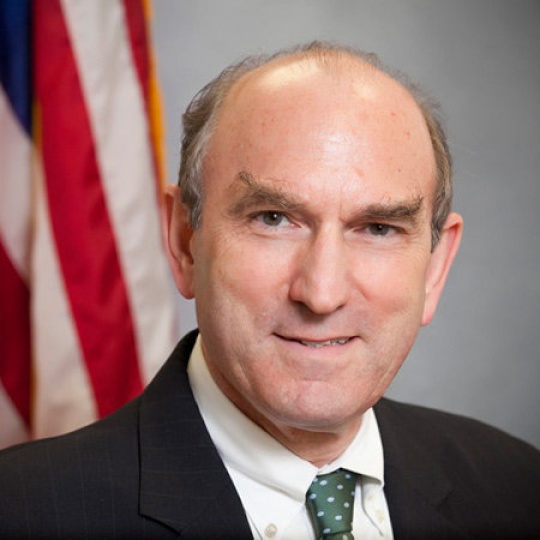
Over the past week, we have witnessed a remarkable display of postmodern propaganda warfare as the US and its Colombian allies orchestrated a fake ‘humanitarian aid’ crisis on the Venezuelan border by weaponising aid shipments. The US has been accused of the unlawful politicisation of aid by the UN and the Red Cross, both of which have refused to work with them. The Corporate Media has studiously ignored mentioning that, or the fact that this small amount of “aid” being used as a political and Media circus by the US, is a rounding error when compared to the amount of legitimate aid being blocked by illegal US sanctions, which includes $2 billion worth of imported medicines.
This crisis even featured a surreal Richard Branson funded ‘fake aid’ gig on the Colombian border which was pretty light on real music talent and attendance and was promptly called out as imperial shilling by a real rock star, Pink Floyd Bassist Roger Waters. As was to be expected, this all ended in what is now being asserted to have been a false flag event in the burning of the aid convoy now being unquestioningly pumped by the biased Mainstream Media as a pretext for a full scale invasion. A Mexican Journalist has independently verified that the burned remains of the US ‘aid trucks’ contained items such as gas masks, metal wire and whistles.
Weaponising Suffering and
Crimes Against
Humanity
The US imposed Sanctions do not target the “Maduro Regime” as often claimed in the Corporate Media, rather they effectively prevent Venezuela from trading their oil on the global market and cripple the national economy. As always, it is the ordinary people who will suffer as a result. The US is banking on the people’s pain leading them to turn on their regime. However as pointed out on Democracy Now by Miguel Tinker Salas, Venezuelan-born professor and author of books on Venezuela and oil, they could just as well turn on the opposition and take it out on those they perceive as being behind the sanctions.
This is a risky and cynical game and the US architects of this strategy are well aware of the harms it causes. Jeremy Scahill quotes William Brownfield the former U.S. ambassador to Venezuela speaking at a Washington D.C. think tank as “publicly saying that it is worth the price of lives and health and humanity of ordinary Venezuelans in order to overthrow a government the U.S. does not like.”
As John Pilger states “it is similar to
that faced by Salvador Allende in 1970 when President
Richard Nixon and his equivalent of John Bolton, Henry
Kissinger, set out to ‘make the economy [of Chile]
scream’. The long dark night of Pinochet
followed.”
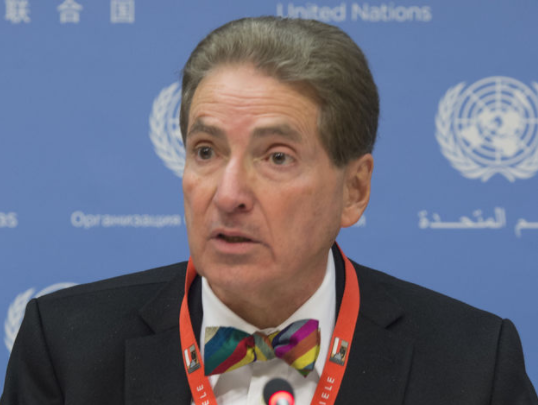
Alfred de Zayas
The former United Nations Rapporteur, Alfred de Zayas, the first UN rapporteur to visit Venezuela for 21 years, has likened all this to a "medieval siege" designed "to bring countries to their knees" or a criminal assault. In fact de Zayas , a former secretary of the UN Human Rights Council (HRC) and an expert in international law, told The Independent the US sanctions on the country are illegal and could amount to “crimes against humanity” under international law. De Zayas is appalled that since the presentation of his Venezuela report to the HRC in September 2018, the report has been ignored by the UN and has not sparked the public debate in the Media that he believes it deserves. It now seems to have mysteriously disappeared from the UN website.
Alfred de Zayas also recently appeared on Al Jazeera English, charging that the U.S. government was engaging in the “weaponization of human rights and the weaponization of aid” in its recent actions against Venezuela on the Colombian border. He has signed an open letter along with Noam Chomsky and over 70 other academics and experts, condemning the coup against the Venezuelan government and calling for a negotiated solution.
Media Rewriting
History
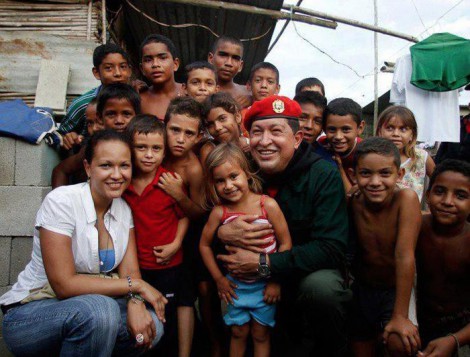
As John Pilger wrote recently, the war on Venezuela is built on lies. The demonisation of ‘Socialism’ and the ‘Maduro Regime’ by the Media has required the rewriting of history through misrepresentation and omission by the compliant corporate media of the positive aspects of the Bolivarian revolution. As Gregory Shupak reports, the US media has effectively erased all trace of the positive gains made by Chavismo. Very little press coverage has been given to the hard data collected by Gabriel Hetland - an academic and expert on Venezuela - and other expert analysts suggesting that the Bolivarian revolution has done many great things for Venezuela’s poor and ‘mestizo’ people.
The much criticised social spending of the Government has been instrumental in decreasing inequality and redistributing democratic power over communities and businesses in this previously highly unequal and stratified society historically ruled brutally and undemocratically by a white upper class economic and political elite. Under Chávez, poverty in Venezuela was cut by more than a third, and extreme poverty by 57 percent in the midst of an opposition led oil strike. Even the CIA’s surprisingly honest Fact Book states:
“Social investment in Venezuela during the Chavez administration reduced poverty from nearly 50% in 1999 to about 27% in 2011, increased school enrollment, substantially decreased infant and child mortality, and improved access to potable water and sanitation through social investment.”
Contrary to the simplistic corporate media narrative of Maduro’s corruption, authoritarianism and mismanagement, Venezuela's economic collapse is, in fact, a symptom of a complex array of factors. According to Gabriel Hetland, these key factors include a pre-revolution legacy of political and economic inequality, IMF imposed debt and austerity measures, significant oil price drops, and a long running economic war conducted by the US and its domestic supporters. Hetland says the Chavistas made three major mistakes: failure to stem the currency crisis (by floating the currency), over dependence on oil revenues and an unwillingness and/or inability to effectively tackle rampant corruption.
Hetland also points out that the ambitious programme of social change in Venezuela has been hampered all along by a heavily stacked playing field and considerable active sabotage from the US and from within. He admits that the Venezuelan government's actions – and inactions – have made the crisis 'far worse', however crucially he states:
“the government has not acted in a vacuum, but in a hostile domestic and international environment. The opposition has openly and repeatedly pushed for regime change by any means necessary.”
There is also absolutely no reality to claims that a US and IMF backed neoliberal regime would address either of Venezuela’s economic problems or this entrenched corruption. Judging by the lack of any progress in past far right dictatorships including neighbouring US client states of Colombia and Brazil, if anything these problems will get worse under a return to elite control. Already, the US and its allies have begun plundering Venezuela’s assets and resources. We will likely see a massive fire sale just as in Libya, where the $1.3bn Libyan Sovereign fund disappeared without an audit trail with the help of corrupt US appointed local officials, Goldman Sachs and compliant international financial institutions.
Manufacturing
a Dictatorship
There is a facile ‘consent manufacturing’ narrative being pushed aggressively by the corporate Media that this US ‘intervention’ is just, inevitable and supported by a united Venezuelan opposition fighting an authoritarian, dictatorial, socialist regime for human rights and freedom. The facts simply do not support such claims. While nobody can claim either Chavez or Maduro's rule was a perfect one (both made mistakes and compounded the extensive economic problems they faced on entering office), Maduro’s regime is also far from the anti-democratic or authoritarian monster the Corporate Media in the West has so aggressively painted it as. This Media narrative of authoritarianism ignores that many independent observers have stated that there is a robust political process in Venezuela and that the 2018 elections were fair despite extensive US interference to polarise and discredit the results.
More than 150 members of the international electoral accompaniment mission for the elections published four independent reports in 2018. Their members 'include politicians, electoral experts, academics, journalists, social movement leaders and others'. The mission's General Report concluded:
'We the international accompaniers consider that the technical and professional trustworthiness and independence of the National Electoral Council of Venezuela are uncontestable.'
The Venezuelan government, in fact, asked the United Nations to send election monitors to observe last year’s election. This request, however, was blocked by the US, which instead encouraged the opposition to boycott the elections, as this supported their later claims that the elections had no mandate. Joe Emersberger reports for FAIR, that Henri Falcón, who actually ran in the election (defying US threats against him) was claimed by opposition-aligned pollster Datanálisis to basically be in a statistical tie with Maduro for most popular among the candidates. As he points out“it is remarkable to see the Western media dismiss this election as “fraudulent,” without even attempting to show that it was “stolen“ from Falcón. Perhaps that’s because it so clearly wasn’t stolen.”
There is a strong political opposition in Venezuela which controls the vast majority of the domestic media channels. The mass media, and US owned social media, are both being used as tools to spread a narrative highly critical of Maduro’s Government, making them a key instrument in political efforts to undermine the legitimate Government within Venezuela. This alone makes claims of Maduro’s government being ‘an authoritarian dictatorship’ because they have recently taken some (ineffective) steps to limit the damage of this information war, utterly and embarrassingly wrong for those journalists pushing such narratives.
Manufacturing a Popular
Uprising
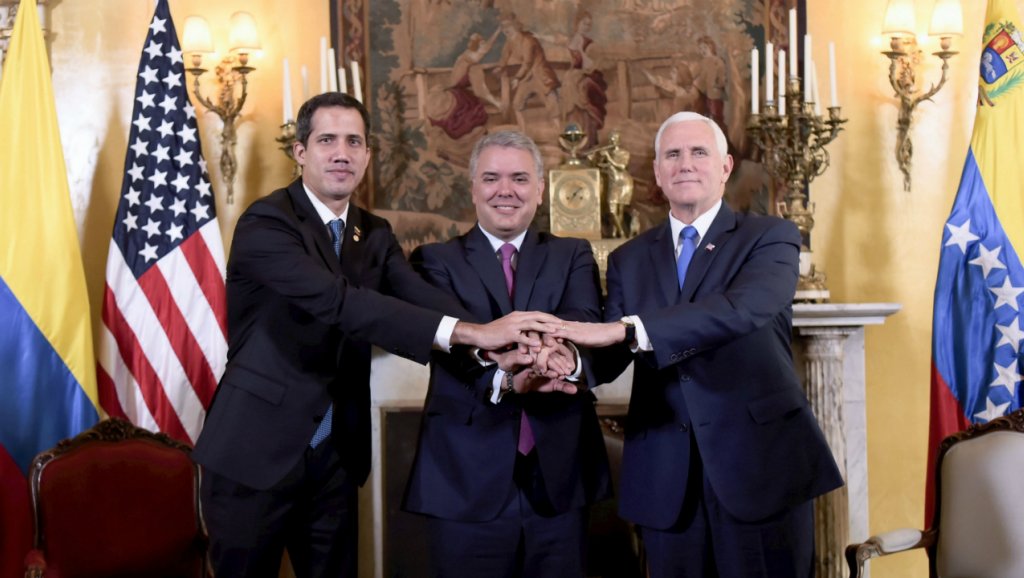
Guaido, Duque and Pence
Guaidó is not a popularly elected champion of the people as he has been painted by the media, including The Guardian in this extraordinary and breathless puff piece of an interview. Rather he is a relatively obscure political pawn handpicked to play a key role in this US power play to restore white supremacy and neoliberal economics to Venezuela and the entire region.
The absurd reality is that Juan Guaidó was until recently, unknown to over 80% of Venezuelans. He did not even run in Venezuela’s May 2018 presidential election. In fact, shortly before the election, Guaidó was not even mentioned by Datanálisis when it published approval ratings of various prominent opposition leaders and less than 20 percent of the country had even heard of him at the time the US unilaterally anointed him as leader.
The key reason Maduro was re-elected in 2018 and remains in power despite such US interference, is that the Venezuelan opposition politicians and the populace are extremely divided politically on the best solution to the current crisis. The revolution can still mobilise widespread popular support from the largely Mestizo (mixed race) lower classes who are aware of both the gains and problems of Maduro’s brand of Chavismo. The Venezuelan public are also aware of the damage US sanctions have caused their population. They also understand the pitfalls of having a US controlled neoliberal government as they have witnessed by the influx of refugees from Colombia fleeing persecution their own right-wing government and its allied militias over recent decades.
Venezuelans are also well aware that military intervention will likely lead to far worse outcomes, not least of which are another period of US supported dictatorship, a pitched civil war or even worse. A fact never discussed by the Corporate Media is that a vast majority of the supposed opposition supporters do not want any US intervention or sanctions. Independent polls suggest that 86% of Venezuelans are against military intervention and 81% oppose the US sanctions. More moderate opposition leaders such as Falcon experience far greater support than Guaidó’s Popular Will party members for these reasons.
However, the far right camp of Guaidó have now been thrust by the US and the Media into the role of annointed opposition leader in a highly undemocratic ‘all or nothing’ power grab. They are now openly calling for military intervention against the will of the population to seal their power grab.
Vijay Prashad, Indian historian, editor and journalist asks Jeremy Scahill on his Intercepted podcast why the United States government is “attempting to cripple the political process in Venezuela to create the preconditions where you can then think there’s nothing else to be done except U.S. intervention to anoint somebody as the president?”
It appears that this ‘deeply undemocratic act’ is part of the wider US strategy to ensure, not just the removal of the Maduro government, but perhaps more importantly, to ensure that the ‘right opposition’ comes to power in the ensuing chaos.
Restoring White Supremacy and
inequality in Venezuela

The class photo of Guaidó’s party members in the National Assembly, vs Maduro’s supporters - spot the difference?
Greg Palast writing for Truthout suggests “White Supremacy is a Key to Trump’s Coup” :
‘This year’s so-called popular uprising is, at its heart, a furious backlash of the whiter (and wealthier) Venezuelans against their replacement by the larger Mestizo (mixed-race) poor.’
Venezuela is a country, like many in South America, riven by a rigid race-based class structure and a history of brutal mistreatment and dispossession of the majority mestizo population by an elite political dynasty. It was only with Chavez’ Bolivarian revolution that these millions of mestizo and poor Venezuelans finally had a voice and a vision of a better future. As John Pilger points out:
“Every major chavista reform was voted on, notably a new constitution of which 71 per cent of the people approved each of the 396 articles that enshrined unheard of freedoms, such as Article 123, which for the first time recognised the human rights of mixed-race and black people, of whom Chavez was one.”
The Venezuelan opposition parties, to varying extents, represent the interests of a small group of the wealthy and mostly hispanic blooded traditional elite of Venezuela. It is these elites that will benefit from US rule and economic privatisation as they have in neighbouring Colombia and Brazil. This group have never accepted the Bolivarian revolution or the idea that the indigenous and uneducated Chavez or Maduro and their supporters had any place in government. John Pilger also says:
“Cartoonists in the Venezuelan press, most of which are owned by an oligarchy and oppose the government, portrayed Chavez as an ape. A radio host referred to "the monkey". In the private universities, the verbal currency of the children of the well-off is often racist abuse of those whose shacks are just visible through the pollution.”
This elite ‘white’ class have fought against the democratic change of Chavismo every inch of the way, including through economic action such as hoarding and price controls, a 2002 coup attempt and militia-led violence at polling stations and in the streets against Chavistas. Oliver Vargas for Morning star Monitor comments:
“In terms of police repression, it is remarkable that Venezuela has remained as open as it has considering the pernicious terrorism that citizens have suffered at the hands of the opposition. These include racist stabbings and burnings (where loyalty to Chavismo is assumed based on skin colour), execution of PSUV community organisers and local officials.”
The mass movements, including trade unions, political parties, workers collectives and popular assemblies that have backed Chavismo since 1998 will face severe repression under right-wing rule. There is no doubt we will see that ubiquitous Latin American tactic of ‘disappearances’ of social leaders, academics and politicians on the left, as has occured after every other US backed right-wing regime changes in the history of the region.
With what sort of reaction would such open rebellion, violence and interference in the affairs of a democratically elected government be greeted in the US or any other Western nation? In light of the treatment of Chelsea Manning or Edward Snowden or even the current ‘Russiagate’ inquiry, it is clear the ‘repression’ would have been far worse than anything Maduro has done to respond to this severe aggression. Perhaps Chavez and Maduro’s biggest mistake will go down in history as failing to adequately neutralise these damaging opposition forces earlier by allowing too much political and press freedom. In the neoliberal post-truth world are such freedoms as a free media and human rights a dangerous luxury that can only be afforded by the powerful Nations?
An Age of
Insanity
The fact that this article even needs to be written says a lot about the post-fact age we live in. It is an age in which economic and information wars, crimes against humanity, undemocratic power grabs, and open threats of invasion of an oil rich democratically ruled nation by the most powerful nation in the world is all shamelessly justified and accepted as normal by the vast majority of the media and many governments. It is also a post ‘peak-oil’ world where powerful nations lie and murder over the remaining dregs of difficult to process ‘Heavy oil’ in Venezuela while scientists warn that we cannot even burn this oil without plunging the world into irreversible climate catastrophe.
And all the while, the ostensibly ‘objective’ Corporate Media is silent on the real issues. We hear all sorts of claims from journalists on Venezuela, but very little space is given to serious analysis by the real experts or even questioning of the supposed moral and legal basis for such actions. The corporate media and political elites’ continued claims to be concerned with human rights or democracy in Venezuela thinly masks a bias towards interventionism, white supremacy and imperialism that has been seen in Iraq, Libya, Syria and elsewhere where economic reasons exist for such intervention. In this era, concepts of ‘human rights’, ‘democracy’ and ‘freedom’ are used as weapons to manufacture consent for the destruction of these very principles in action.
Solutions Do
Exist
This risky regime change
game being played by the US and allies in Venezuela could
seriously backfire and lead to a bloodbath like Vietnam or
Syria, or even worse, it could spread over the borders
sparking war across Latin America. Contrary to what we are
told in the Media, regime change and war are not inevitable.
There are real alternative solutions available in Venezuela
that do not involve economic sanctions, overthrowing a
democratically elected government in a coup, destroying
socialism in Latin America or launching a bloody civil war.
These solutions may just take some brave and lateral
thinking by the global community to find solutions that do
not hurt the people more. They may instead involve dialogue,
negotiation and a commitment from the international
communities to respect democratic processes. They will also
require journalists and ethically sound national governments
to finally stand up to the bullying and illegal behaviour of
the USA and their allies. However, the voices of reason
suggesting such approaches seem likely to be drowned out yet
again by the drums of war and the inanities of the religious
fervor of neoliberal ideology gripping our political and
media institutions. At present it seems only a very small
group of nations, generally those outside of the neoliberal
hegemony, are prepared to even consider such possibilities.
However, I will explore some of the possible alternative
solutions to the Venezuela crisis in the next piece in this
series.
The most typical and distinctive form of Venezuelan music is joropo, a rural folk music which originated in the plains and often features a Harp. Juan Vicente Torrealba was one of the greatest exponents of this music:


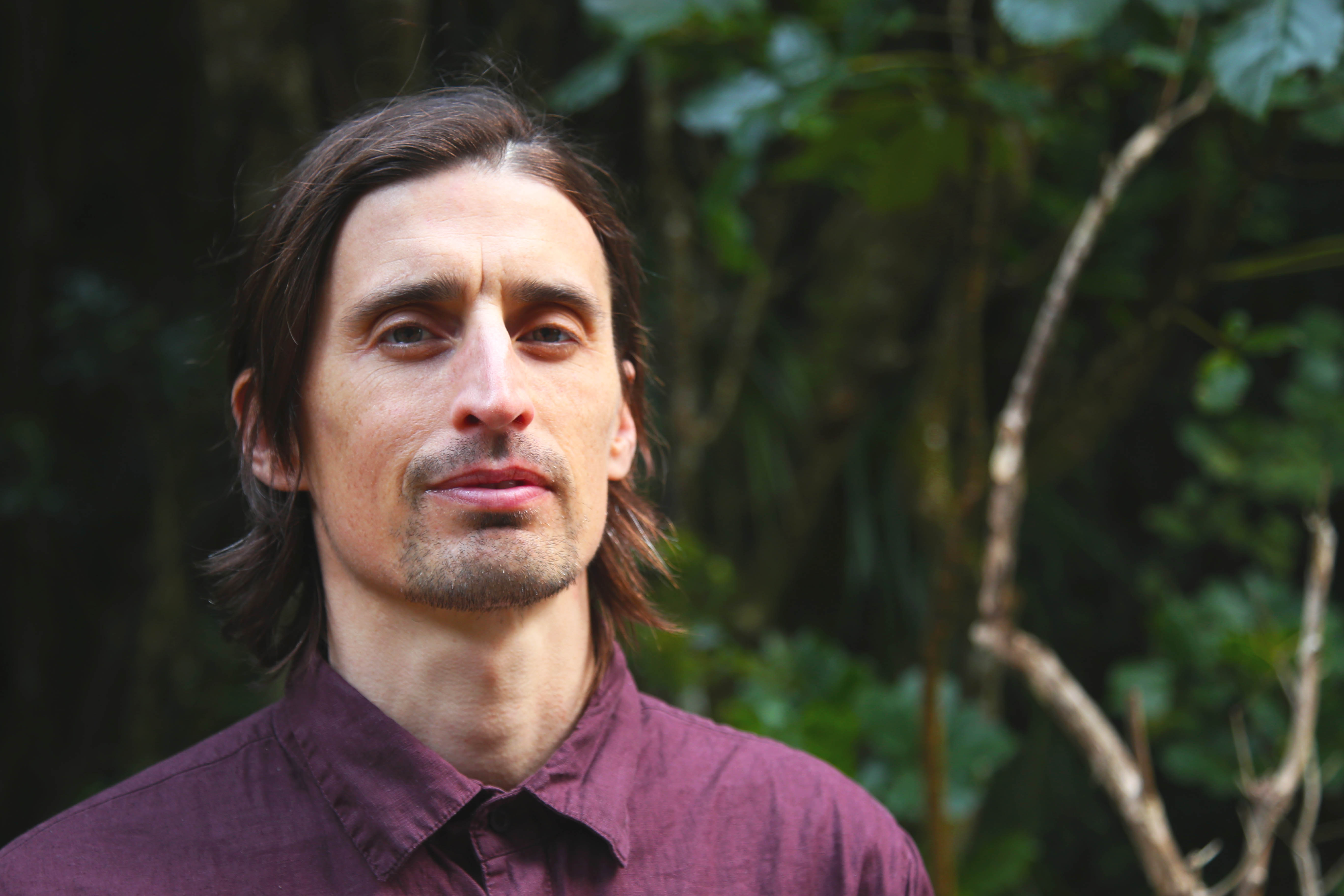
 Martin LeFevre - Meditations: Psychedelics, Mystical Experiencing, And Organized Religion
Martin LeFevre - Meditations: Psychedelics, Mystical Experiencing, And Organized Religion Keith Rankin: Equity Rights - UBI, SUI, BUI, HUI, Or GUI?
Keith Rankin: Equity Rights - UBI, SUI, BUI, HUI, Or GUI? Binoy Kampmark: The Inevitable Souring - Elon Musk Falls Out With Donald Trump
Binoy Kampmark: The Inevitable Souring - Elon Musk Falls Out With Donald Trump Ian Powell: Postscript On Ethnic Cleansing, Genocide And New Zealand Recognition Of Palestine
Ian Powell: Postscript On Ethnic Cleansing, Genocide And New Zealand Recognition Of Palestine Gordon Campbell: On Why Leakers Are Essential To The Public Good
Gordon Campbell: On Why Leakers Are Essential To The Public Good Ramzy Baroud: Global Backlash - How The World Could Shift Israel's Gaza Strategy
Ramzy Baroud: Global Backlash - How The World Could Shift Israel's Gaza Strategy